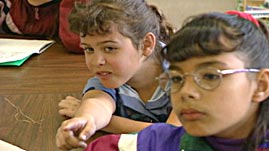Teachers' Domain - Digital Media for the Classroom and Professional Development
User: Preview

Source: WGBH Educational Foundation


Group discussion and group skills are important components of a science education. In group discussions and activities, students can actively listen to each other’s ideas, share observations and ideas by talking with others, incorporate others’ experiences to access more ideas, and help each other troubleshoot. In larger groups, it is important to make sure that all students’ voices are heard.
In Linda Block’s lesson for her unit “Completing the Circuit,” students reflect on and compare each other’s diagrams of electrical circuits. They work with content knowledge and scientific practices by engaging in a dialogue with the teacher and each other—asking and answering questions with careful attention to their logic. Block gives her students the chance to talk about each other’s work and teach other.
By reflecting on their own approaches and methods, students can put content lessons and classroom activity together for a more connected educational experience. Group discussion gets students to think about what they’ve accomplished and make connections between their accomplishments. It also helps them develop a kind of scientific community in the classroom in which they rely on each other for learning.
 Loading Standards
Loading Standards